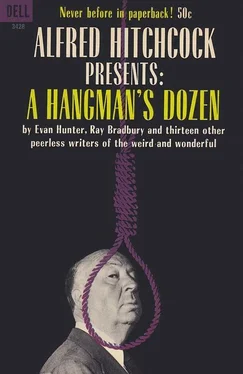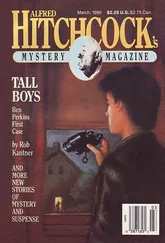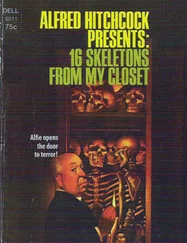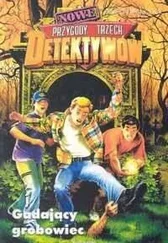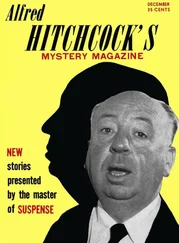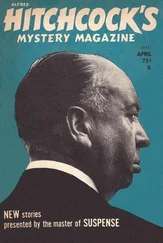“My God,” the pilot said. “He’s not coming up, Mr. Roscoe I”
“He’s got to come up! He’s got to!”
Three minutes passed, but there was no sign of the great Ferlini.
At the end of six minutes, Wanda Ferlini moaned, swayed, and fainted. Roscoe caught her falling body before it struck the floor of the boat. Five minutes later he ordered the pilot to head back for shore.
They recovered Ferlini’s handcuffed body late that night.
Baggett tried to see Wanda on the day of the funeral but it was Phil Roscoe who refused him admittance. Phil didn’t care about Wanda’s love life; he had too many problems of his own. But he was still a businessman, and Wanda was still a client, even without her famous husband. It just didn’t seem smart to have Wanda appear as anything more than a tragic widow.
Wanda was playing the role well. By some strange cosmetic alchemy, her sorrow made her look younger. Her white-powdered face and pale lipstick contrasted well with her black mourning attire.
Roscoe had made the funeral arrangements, and they were almost as spectacular as the water escape itself. The turnout was large and well-covered by the press; a horde of show people, not averse to being seen themselves, were on hand to mourn the passing of the great escape artist. The funeral procession wound slowly through the streets of the town, requiring a full half-hour to pass any one city block, but by the time Ferlini’s coffin had reached the point of no return the crowd had thinned out considerably. Only a handful watched the final ceremonies in the graveyard.
Wanda sobbed against Roscoe’s shoulder, and he patted her consolingly.
“It’s the way he wanted it,” he said inanely.
“I know, I know,” Wanda said.
The eulogy, delivered by the town’s most prominent clergyman, was brief. He spoke of Ferlini’s courage, of his devotion to his art, of the pleasure he had given so many people in his lifetime. As he spoke, Wanda’s eyes glazed oddly, and for a moment, Roscoe was fearful that she might swoon again.
They brought the coffin to the edge of the grave. The bearer in front, a waiter in the supper club, seemed puzzled by something, and murmured to the man beside him. Roscoe stepped forward, spoke briefly to them, and then conferred hastily with the minister. The conference piqued the curiosity of the solitary newsman on the scene, who came out of the sidelines to ask what was happening.
“I dunno,” Roscoe said, scratching his head. “Freddy here thinks something is wrong. Says the coffin feels strange.”
“How do you mean, strange?”
The waiter shrugged. “Light is what I mean. It feels too light.”
“Really,” the minister whispered. “I hardly think—”
“No, he’s right,” another bearer said. “Hardly weighs anything at all. And you know Ferlini, he was a big, hefty guy.”
They looked at the coffin, waiting for someone to make a suggestion. It was Roscoe, finally.
“I hate to do this,” he said softly. “But I think we’d better open it.”
The minister protested, but they were already working on the lid.
“What’s happening?” Wanda said. “What’s going on, Phil?”
“Keep back,” he pleaded. “I don’t want you to see this, Wanda—”
But there was no way for her to avoid it. The lid was opened, and the truth was revealed to the sight of all. It sent a shock through the crowd as tangible as a blow.
The coffin was empty, and Wanda Ferlini was screaming like a high wind among the treetops.
Dr. Rushfield rolled a pencil along the blotter of the desk, and said, “Go on, Mr. Roscoe, I want to hear it all.”
Phil Roscoe licked his dry mouth and wished he had a drink.
“You’ve got to understand how it is in my business, Doctor. Everything is showmanship, everything. That’s why Ferlini made this deal with me, maybe ten, twelve years ago.”
“And just what was this deal?”
“Nobody else knew about it, just him and me. It was crazy, I told him that. But you don’t know how stubborn a guy like that can be. He made me promise that if anything ever happened to him, I mean if he died, that I would arrange for one last trick — something that would make him remembered even longer than Houdini. That’s what it was, Doc.”
“A trick?”
“A real easy one. I just slipped the undertaker fifty bucks, and he arranged to have Ferlini buried some place in secret. Then he put an empty coffin in the hearse, and that was that. You see what I mean, don’t you? Honest-to-goodness showmanship.”
“I see,” Rushfield said, frowning. “But I’m afraid that it had quite an effect on Mrs. Ferlini. I gather that she wasn’t too well-balanced before this happened, and now...” He sighed, and stood up. “All right, Mr. Roscoe. I can let you have one look at her, but I can’t let you talk to her. I’m sorry.”
Roscoe followed the doctor down the hall. They stopped at a door with a small barred window, and Roscoe looked inside. He drew back, appalled, at the sight of Wanda, her eyes round and unseeing, her arms straining uselessly to escape from the tight, unrelenting grip of the straitjacket.
Not a Laughing Matter
Evan Hunter
Don’t laugh — or smile ambiguously — when a sensitive person is present. He may very well be a paranoiac Perchance he may even be given to homicide — a homicide that may be your very own.
* * *
He hated the manager most.
Last night he had come to that realization. This morning, as he entered the department store with the Luger tucked into the waistband of his trousers, he allowed his hatred for the manager to swell up blackly until it smothered all the other hatreds he felt. The manager knew; of that he was certain. And it was his knowledge, this smirking sneering patronizing knowledge which fed the hatred, nurtured it, caused it to rise like dark yeast, bubbling, boiling.
The Luger was a firm metal reassurance against his belly.
The gun had been given to him in the good days, in Vienna, by an admirer. In the good days, there had been many admirers, and many gifts. He could remember the good days. The good days would sometimes come back to him with fiercely sweet nostalgia, engulfing him in waves and waves of painful memories. He could remember the lights, and the applause, and...
“Good morning, Nick.”
The voice, the hated voice.
He stopped abruptly. “Good morning, Mr. Atkins,” he said.
Atkins was smiling. The smile was a thin curl on his narrow face, a thin bloodless curl beneath the ridiculously tenuous mustache on the cleaving edge of the hatchet face. The manager’s hair was black, artfully combed to conceal a balding patch. He wore a gray pin-stripe suit. Like a caricature of all store managers everywhere, he wore a carnation in his buttonhole. He continued smiling. The smile was infuriating.
“Ready for the last act?” he asked.
“Yes, Mr. Atkins.”
“It is the last act, isn’t it, Nick?” Atkins asked, smiling. “Final curtain comes down today, doesn’t it? All over after today. Everything reverts back to normal after today.”
“Yes, Mr. Atkins,” he said. “Today is the last act.”
“But no curtain calls, eh, Nick?”
His name was not Nick. His name was Randolph Blair, a name that had blazed across the theater marquees of four continents. Atkins knew this, and had probably known it the day he’d hired him. He knew it, and so the “Nick” was an additional barb, a reminder of his current status, a sledgehammer subtlety that shouted, “Lo, how the mighty have fallen!”
“My name is not Nick,” he said flatly.
Atkins snapped his fingers. “That’s right, isn’t it? I keep forgetting. What is it again? Randolph Something? Clair? Flair? Shmair? What is your name, Nick?”
Читать дальше
